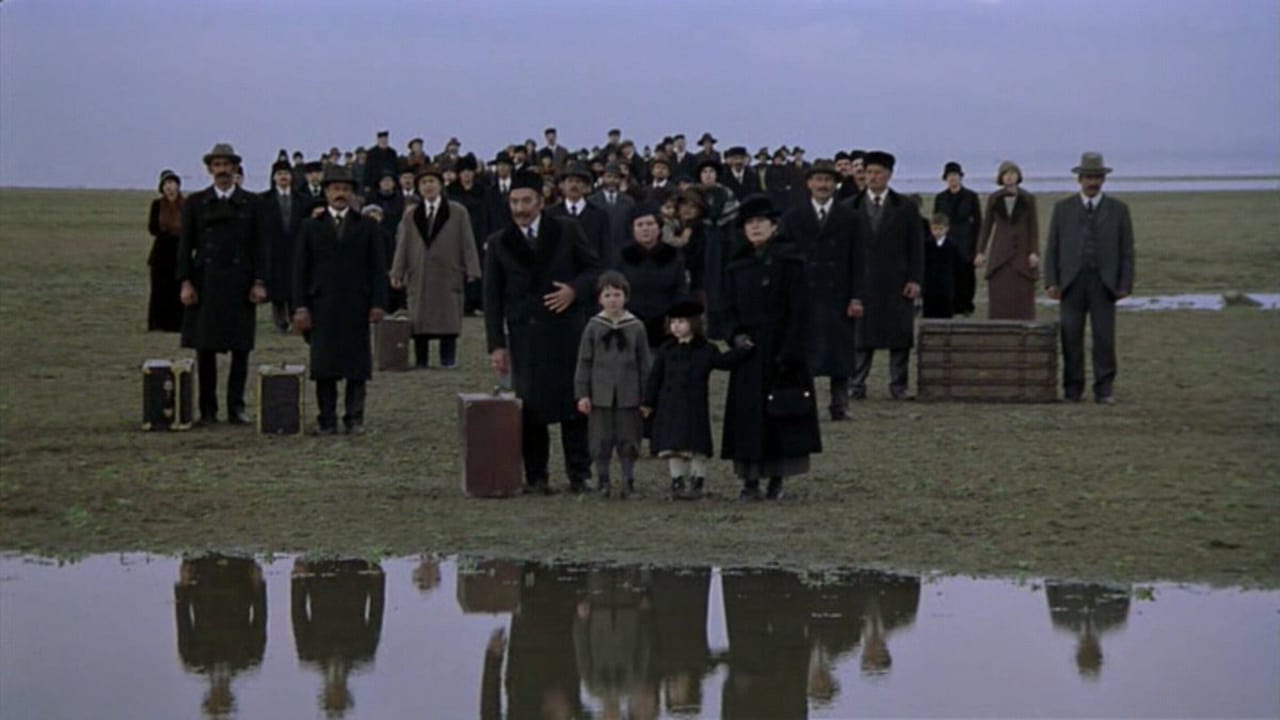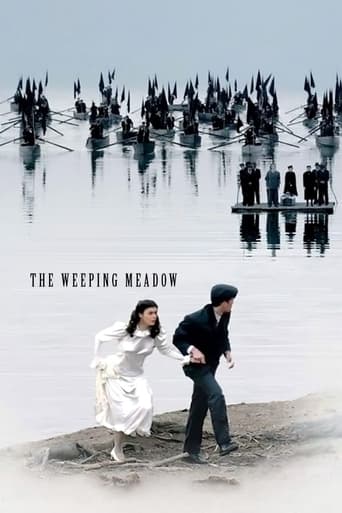Solemplex
To me, this movie is perfection.
Glucedee
It's hard to see any effort in the film. There's no comedy to speak of, no real drama and, worst of all.
Chirphymium
It's entirely possible that sending the audience out feeling lousy was intentional
Frances Chung
Through painfully honest and emotional moments, the movie becomes irresistibly relatable
Nick Dees
I viewed this movie at the TIFF in 2004. It was the first film I ever seen their and I have been going back every year since, hoping to see something that was as moving. By far one of the greatest films I have ever viewed. The cinematography, the acting, the script all worked hand in hand. At times when the dialogue was silent you were still captivated by what was being shown on the screen.The movie is long, but I did not lose interest once. I was lucky enough to meet Mr. Angelopoulos at the premier of his film and believe me for a movie buff like me it was a great honor even thought I did not realize it at the time. I believe that this film should be on every bodies must watch list if you are looking for a movie that is deep.I have since viewed a lot of movies and have yet to fond anything that I believe is as important.
goat_lalonde
This film is good, and very moving, but extremely tedious. Almost every single shot in the film is set up exactly the same; master shot, maybe some movement, maybe not, and then the camera stops for a few seconds and begins to slowly zoom in turning a long shot into a medium long/medium shot, that's basically every single shot, no variety, no change. It's such a beautiful film it's a shame that the director and cinematographer chose to shoot every scene the same because this just heaps on tedium, why would I want to see the same set-up over, and over. When shooting a film like this, a minimalist tragedy, you have to have a perfect eye for composition (like Tarr's Satantango, or Hou's The Puppetmaster) because it's very easy for your film to become boring just from the way you shoot it. You can set-up shots in a similar manner (Hou very often shoots through doors, and across balconies, etc...), but not every shot should have the same formula.The other problem with this film is Alexandra Aidini. Her performance is awful. She always seems over-emotional, and none of her reactions seem realistic. She always seems overly morose, and has not the range for the role she was cast in.I was really ready to love this film, and did for the first 1 1/2 (approx.), but I just became bored after a while. It's not that I'm not use to films like this, I love the minimalist films of (the aforementioned) Tarr, Hou, and Tsai Ming-liang, Jia Zhang-ke, Bresson, etc... but their films (sans one, or two) never seem repetitive, unfortunately this film does. Still a good film, though.
Cosmoeticadotcom
In some ways, this film takes the best parts of the work of Federico Fellini, Terrence Malick, and Michelangelo Antonioni, and stews them until they melt into a work only Angelopoulos could make. However, what separates Angelopolous films from most other films by even some great filmmakers, is his screenplays. This film was written by him, longtime Fellini collaborator Tonino Guerra, Petros Markaris, and Giorgio Silvagni, and even though- like the other films of his I've seen, this one is spare in dialogue, the story coheres because of the way the scenes are written to allow the actors' expressions convey what words need not. And, like Yasujiro Ozu, Angelopoulos is a master of ellipses- never fully explaining certain things in a film, nor deliberately not showing the viewer things that would be standard in a more linear film. The film's cinematography, by Andreas Sinanos, is spectacular, from the long shots that follow characters from afar, to well-composed foregrounded scenes, to the uses of color throughout. The film starts with muted, almost sepia tones, and grayness, then exhibits flashes of color, here and there, while mostly staying in dark greens, blues, and browns. This heightens the grander moments, such as the bloody death of the musician in the white sheets. The use of water is also wonderful- from the film's reflected shots at the opening, through the constant rains and floods, to the last shots overlooking the water- a far better use of imagery than a similar shot which ends Alexander Sokurov's Russian Ark. In fact, the scenes of the flooded town were a set built in a high, dry portion of Lake Kerkini, which by March, would rise and submerge the set.The musical scoring by Angelopoulos's longtime collaborator, Eleni Karaindrou, is solid, mixing folk songs with classical compositions, all in an understated manner- excepting a great scene where the son auditions with his accordion. Yet, several times in the film, there seems to be an odd noise- like jet sounds in the aural background of some scenes. Is this symbolism or a flaw? Even if a flaw, it is a very minor one, for aside from the aforementioned scenes there are numerous other great scenes in this picaresque film that coheres in the Negatively Capable way John Keats claimed great art works; such as when Nikos dances at night as a saxophone plays, or when Eleni, in fever, babbles on and on of the same things. Yet, at the center of this great film is not only the ellipsis of information, but the ellipsis of self- the exile from everywhere, a theme that defines much of Angelopoulos's work, even if it does not define his art, for that is always on target, and brilliantly wrought. The Weeping Meadow is no exception to that claim.
kourdos
I had watched years ago some older films of Aggelopoulos and i was expecting a slow movie, with minimal dialogues, many symbolisms, weak plot and superb photography. I got exactly what i expected and something more: i left the theatre with an extreme satisfaction.The film: Greece roughly between 1920 and 1950 (but it is so current and contemporary because it deals with global, recurring themes). The life of the nation through events: national catastrophes, refugees, social and political unrest, world and civil wars. The life of the person through emotions: love, lust, pride, hope, love, desperation, ambition, love, death. And many symbolisms and extremely powerful and beautiful scenes with references from ancient myths to current international affairs. And rain, lots of rain :-) The plot and the development of the characters may appear weak. We are used to ready meals from the business of cinema, which overwhelm us with fast dialogues, "strong" performances and "exciting" situations. And that's fine. But cinema and people need also the approach of Aggelopoulos, we need some space and time, to reflect and realise our existence. "To Livadi pou dakryzei" gives more freedom and time to the viewer to participate with his feelings and memories and thoughts. That's exactly interactive art.These are some of my interpretations of some scenes: village flooding (Climate Change and the forces of Nature), immigration/separation (departure of my girlfriend), mother crying over her soldier sons dead bodies (this is a real war scene, not the computer games style). You will identify with other scenes (everyone has an opinion, right ?) and you will feel alive.I am grateful to Aggelopoulos for giving me the chance to look inside myself, remember, sigh, think.

